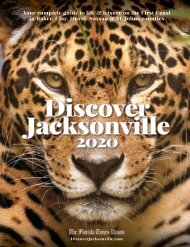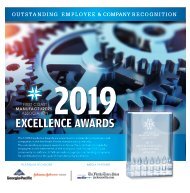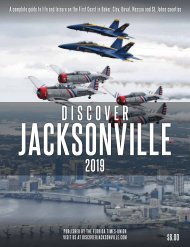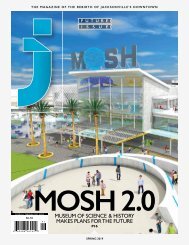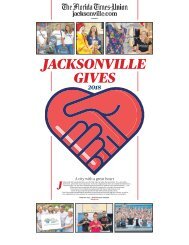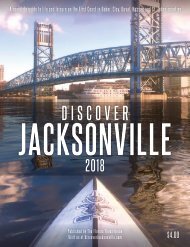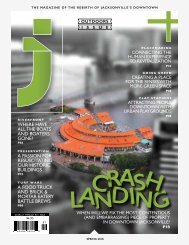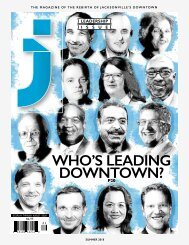J Magazine Winter 2019
You also want an ePaper? Increase the reach of your titles
YUMPU automatically turns print PDFs into web optimized ePapers that Google loves.
Todd Brearley, the Design and Construction Project Manager for the new Regional Transportation Center, leads a tour of the project with CEO Nat Ford.<br />
um to the sparkling new Regional Transportation Center and a health<br />
corridor from Baptist Medical Center straight up Main Street to UF<br />
Health Jacksonville.<br />
Some of that is in the very near future, and you’ll be fascinated to<br />
hear what he see farther out.<br />
But to appreciate the vision of Nat Ford, you have to get there<br />
through three inflection points in his career that brought him to Jacksonville.<br />
Inherent passion<br />
Public transportation always has been an essential part of the life<br />
of Nathaniel P. Ford Sr. He was reared in Queens, N.Y., where his father,<br />
a Mississippi native, worked his way up from the New York subways<br />
track department to chief operating officer for the entire system, with<br />
tens of thousands of employees.<br />
“All of those years,” Nat Ford remembers, “I got a front-row seat<br />
to see what transportation was all about, a system that ran 24 hours a<br />
day, seven days a week, and with his increasing levels of responsibility,<br />
quite often he worked 24 hours, seven days a week. I remember<br />
him answering the phone, and it was the control center for the New<br />
York City subway system, looking for him to deal with management issues,<br />
operational issues, emergencies, things of that nature. And then<br />
off he went to take care of it.”<br />
Throughout his childhood, Nat routinely used the New York public<br />
transportation system himself.<br />
“A lot of young people actually used the subway to get to school<br />
and activities. I used the bus, the city bus, to get to elementary school,<br />
middle school and high school.”<br />
After he graduated early, at 16, after not having had to study much,<br />
Ford’s first year of college “may not have been one of the most successful”<br />
but, as we say, “built a lot of character … So I came back from<br />
school, and Dad was like, OK, well, you’re home, but you’re going to<br />
have to go find a job.”<br />
Ford worked for a while as a commodity market clerk, but after a<br />
few years, he was drawn to a much higher-paying job back at the transit<br />
authority — as a union train conductor.<br />
Over the next 10 years, perhaps inspired by his father’s success,<br />
Ford quickly worked his way up, always taking the Civil Service exam<br />
for the next higher job and winning four or five promotions. “Being<br />
unmarried, no children, that kind of thing, I was able to study a great<br />
deal,” he said. “And I was able to end up in the top 10 out of hundreds,<br />
if not thousands of competitors, for the next position.”<br />
Ultimately he became a superintendent of district operations.<br />
“So at that time, at the young age of my early 30s, I was managing<br />
a few thousand people and had a number of terminals and facilities<br />
and rail yards that were under my watch. A young person with a lot of<br />
responsibility.”<br />
Along the way, Ford found his passion and his first inflection point.<br />
“The real excitement came when I finally reached the level of train<br />
dispatcher, where I was running a terminal. I was actually, for an<br />
eight-hour period, literally processing hundreds of trains using a team<br />
of train operators, signal maintenance, things of that nature. I had the<br />
thrill of — I hate to describe it as such — but really nowadays, you see<br />
WINTER <strong>2019</strong> | J MAGAZINE 21



